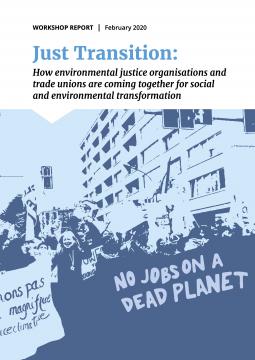Download the full workshop report here.
Introduction
This short discussion paper seeks to share some of the key insights and questions from a meeting of representatives of labour and environmental justice organisations from countries in Africa, Latin America, and Europe.
A variety of different projects and collaborations in recent years have been working to unite these two powerful and critical movements for transformation in different contexts around the world. Participants from three continents met in Amsterdam in 2019 to discuss their shared challenges, insights, and vision for the future.
The concept of Just Transition first emerged in the United States in the 1970s. The idea emerged from negotiations between unions, community members, and environmental organisations around the closure of a nuclear power plant. This new framework led to a growing and powerful movement in the US, that has evolved and increasingly incorporated other dimensions into the discussion, both at the national level and in exchanges with other global movements. Through the 1980s and 1990s the concept was increasingly picked up around the world. It gained popularity as a powerful framework, which could express workers’ demands in relation to environmental conflicts, and unite different forms of resistance against the political economic model that has been trashing the planet, concentrating wealth, and increasingly exploiting workers around the world, with impacts falling disproportionately on marginalised communities. While the discussion of just transition originated in the energy and extractive sectors, energy use lies at the basis of our food systems, public services, transportation, and production and distribution system; transforming the way we use and think about energy requires deep transformations in every sector.
Beginning in the second decade of the 21st century, and particularly in the wake of the Paris Agreement in 2015, a growing number of projects have emerged to consciously build alliances between labour movements and other social and environmental justice movements and organisations. These alliances are using joint actions to develop a broad and deep vision of just transition.
The concept of just transition, however, has not escaped the notice of powerful economic and political actors. Some governments and transnational corporations (TNCs) are now advancing visions that pay lip service to the concept of ‘just transition’, while allowing them to continue to profit from initiatives that social movements around the world have branded as ‘false solutions’. From cap and trade systems, to carbon capture and geoengineering, to the promotion of massive, monocultural agrofuel plantations, a number of deeply problematic ‘solutions’ to the climate crisis are on the table. These are often informed by a narrow vision of ‘net-zero’ (achieved through carbon trading) or marginally reduced emissions, with little regard for broader environmental, social, and economic problems, or for human rights. Many of these proposals will deepen inequality; dispossess mar- ginalised people of land and resources; diminish democratic control over resources; privatise commons, public goods and services; further the exploitation of workers; and preserve the most damaging aspects of our current economic system. This is in sharp contrast to understandings of just transition driven by peoples’ movements, which see environmental harms as just one critical manifestation of a broader crisis.
In response, social movements are increasingly uniting to ensure that the concept is not watered down to the point of meaninglessness, or captured by actors who would use it to prop up a dysfunctional status quo. Just transition is, therefore, not just a contested term but a space of contestation into which social movements are stepping in order to shape the common understanding of the term. A robust and radical vision of just transition sees environmental destruction, capitalist extraction, imperialist violence, inequality, exploitation, and marginalisation along the axes of race, class, and gender (among others) as simultaneous effects of one global system which must be transformed. Proponents argue that, fundamentally,‘solutions’ which try to address a single dimension, such as environmental catastrophe, in isolation from the social, cultural, and economic structures which give rise to it, will inevitably remain ‘false solutions’.
Developing, deepening, and applying this analysis in diverse, complex, and local situations is itself a long process of building mutual understanding and solidarity. Exploring, understanding, and resolving tensions between historically separate movements is an important part of this process. Different movements have differing priorities, commitments, and ways of working, and their visions of just transition may differ in some important ways. This means that a clear joint analysis, and a harvesting of the insights from years of collaboration, including how strategic and theoretical differences have been overcome in particular struggles, is more vital than ever.
The movements which are today beginning to consolidate proposals under the name ‘just transition’ have a rich history. Movements against free trade agreements and neoliberalism; the alter-globalisation movement; energy sovereignty and democracy struggles; environmental justice movements; labour movements; decolonisation and independence struggles; feminist and women’s movements; movements against racism; and fights for agrarian reform, peasant rights and food sovereignty, among others, have helped to lay the groundwork for discussions today. This diversity of backgrounds, political traditions, and strategic goals means that the dialogue that is creating a radical concept of just transition is not free from tensions or contradictions. However, it is increasingly clear that a critical mass of organisations or movements see the vital importance of working through these tensions in order to form stronger and more radical alliances for systemic transformation.
With this report we share some insights from one part of this broader dialogue and hope to make a modest contribution to the ongoing discussion. We aim to share some key insights about the principles of the concept of just transition which is emerging from shared struggles, and how this radical vision must be defended and put into practice.
Read the full report on TNI.org: https://www.tni.org/en/justtransition
